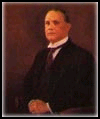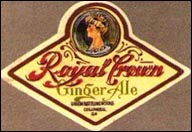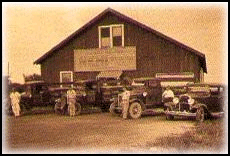RC STORY
| Chapter One | ||||
| A SOFT DRINK COMPANY IS BORN | ||||
|
Royal Crown Company Inc., originally called the Union Bottling Works, was born in Columbus, Ga. in 1905. A young graduate pharmacist, Claud A. Hatcher, began creating his own soft drinks in the basement of his family's wholesale grocery business. From these humble beginnings, Royal Crown Cola Co. grew to be the third largest soft drink company in America. |
|
||
| At first, the Hatcher Grocery Co. purchased bottled drinks from a local bottler and resold them to its grocery customers. As this part of the business grew, Mr. Hatcher insisted that the bottler pay the company a commission or compensate him in some way for handling the drinks. A dispute arose and Mr. Hatcher concluded that his company had purchased its last case of drinks from an outsider. Henceforth, it would produce and bottle its own drinks under its own labels. | ||||
| The first line of beverages was named Royal Crown, and the first cola drink that he devised was called Chero-Cola. Subsequent generations were to apply the Royal Crown trademark to a cola, and it was to become so important that the corporation would be renamed "Royal Crown Cola Co." |
||||
| Shortly after the Hatcher Grocery Company decided to engage in the manufacture of soft drinks, its officials organized the wholly owned Union Bottling Works. The manufacture and bottling of soft drink syrups continued within the framework of the Union Bottling Works until 1912, when the newly organized Chero-Cola Co. took over the business and vastly expanded it. |
|
|||
| Among the early products were Royal Crown Ginger Ale, Royal Crown Strawberry, Royal Crown Root Beer and Chero-Cola. | ||||
| As the sales of carbonated beverages by the Hatcher Grocery Co. became more important, it was decided to incorporate the Chero-Cola Co. In 1912, a charter was granted by Judge S. Price Gilbert in Muscogee County Superior Court of Columbus. The company was to manufacture a line of syrups and flavour concentrates to be sold to franchised bottlers who bottle and sell these concentrates and syrups under trademarks owned by the Chero-Cola Co. In April of 1914, Chero-Cola Co. filed application in the United States Patent Office to register its trademark, Chero-Cola. The Coca-Cola Company then instituted a law suit that lasted for more than nine years. |
|
|||
| In fact, litigation concerning the use of the company's trademark continued in one form or another until 1944 when the final victory was won by Royal Crown Cola Co., setting for all times its right to use the word "cola" in the name of its beverages.
The years 1914 - 1920 showed steady, but at times, rapid growth in sales. Both profits and company assets increased steadily. |
|
|||
| THE FIRST CRISIS
Chero-Cola Co. faced its first crisis during World War I. In 1918, the Food Administration imposed a severe limitation on the use of sugar by less essential food products, which included soft drinks. This limitation failed to ease the sugar crisis, and in the latter part of 1918, a meeting was held by government officials for the purpose of declaring the soft drink industry non-essential and ordering it to be closed up for the duration of the war. However on presentation of the facts showing the widespread nature of the industry, its aggregate size and importance, the threat failed to materialize. |
 |
|||
| As a first effort to relieve the sugar shortage, Chero-Cola Co. established and operated its own sugar refineryIt purchased a supply of raw sugar from Cuba. Chero-Cola Co. operated the refinery for a period of about three years. The refinery was not able to furnish the entire sugar requirements of the company, and its output had to be supplemented by the purchase of refined sugar. After approximately two-million dollars worth of sugar had been purchased, filling to capacity every company warehouse in Columbus, the inevitable occurred. The price of sugar dropped drastically. It hit a low of eight cents a pound in December of 1920.To compound the troubles of the struggling company, the depression was well within sight. During the years, 1922 - 1924 common stock was sold in order to raise capital. It was not until 1926 that all of the debts of the company incurred during this first crisis were finally paid. The continuous growth and successful operation of the company during the years of 1912 through 1919 had generated a firm confidence in the business and its management. Without that confidence, the permanent financing which enabled the corporation to survive its first crisis could not have been obtained. |
|
|||
| It was during this severe sugar shortage that a basic change in the operations of Chero-Cola took place. Heretofore all of its products were made and shipped in the form of finished bottling syrup, with all the ingredients, including sugar, already added. |
|
|||
| Nothing had to be added by the bottler except water and carbonation.
The sugar crisis, along with the sky-rocketing price of sugar as a result of the shortage, forced Chero-Cola Co. to consider some other forms of manufacturing. Therefore, it was during the first half of the 1920s that the Chero-Cola Co. began to ship its products to bottlers in the form of concentrates instead of syrup. This procedure required the bottler to add pure cane sugar and water to the concentrate. At that time, one gallon of concentrate yielded 26 gallons of soft drink syrup. This resulted in savings, both in the container and in the freight cost. It also enabled the finished beverage to have a fresher taste. The policy of shipping concentrates instead of syrups has continued to the present day. |
|
|||
| When the policy of franchising bottling plants was instituted in 1912, the first bottling plants, quite naturally, were in the southeast. Prior to World War I, Chero-Cola had acquired about 25 new bottlers each year. During the war and thereafter, because of the sugar shortage and economic conditions, no extensive effort was made to further expand the bottler network until 1922. Even so, by the close of 1921 there were over 200 plants in the bottler organization. From the beginning, the company had sought to establish its bottlers on a sound and permanent basis. | ||||
| It had never been willing to grant an exclusive franchise or to sell its products to just any bottler willing to accept them. |




